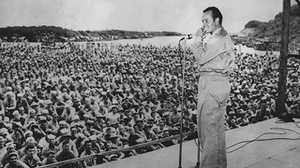When is it OK to Lie?
From the Collections: The Presidents | Leadership in times of crisisWeapons of Mass Destruction
The final nail in the coffin of the hunt for Iraq’s weapons of mass destruction came in January 2004 when David Kay told President Bush the intelligence reports had been wrong. There were no WMD. “It went to the heart of the Iraq question,” said journalist Peter Baker. “Did the administration mislead the public in some way? Did it intentionally deceive the American people in order to go to war?"
From the film: George W. Bush
The Lewinsky Scandal
Clinton understood how the allegations of a sexual relationship with a White House intern could derail his presidency. He asked Dick Morris if he should lie to the American people. "They will forgive the adultery, but they won’t easily forgive that you lied." Morris concludes.
From the film: Clinton
Arms for Hostages
Despite his firm stand against dealing with terrorists, in November 1986 Reagan admitted that arms had been shipped to Iran but denied that the arms were a trade for hostages.
From the film: Reagan
Campaigning on Honesty
Jimmy Carter campaigned on a platform on honesty at a time when the nation sorely needed it. "The country had been through a horrible time, and Jimmy Carter represented honesty and decency," said journalist John Farrell.
Creating a Reason to Go to War
President Roosevelt did not tell Congress or the American people the truth behind the Greer incident that led to US involvement in World War II. "I am perfectly willing to mislead and tell untruths if it will help win the war," FDR told a friend.







